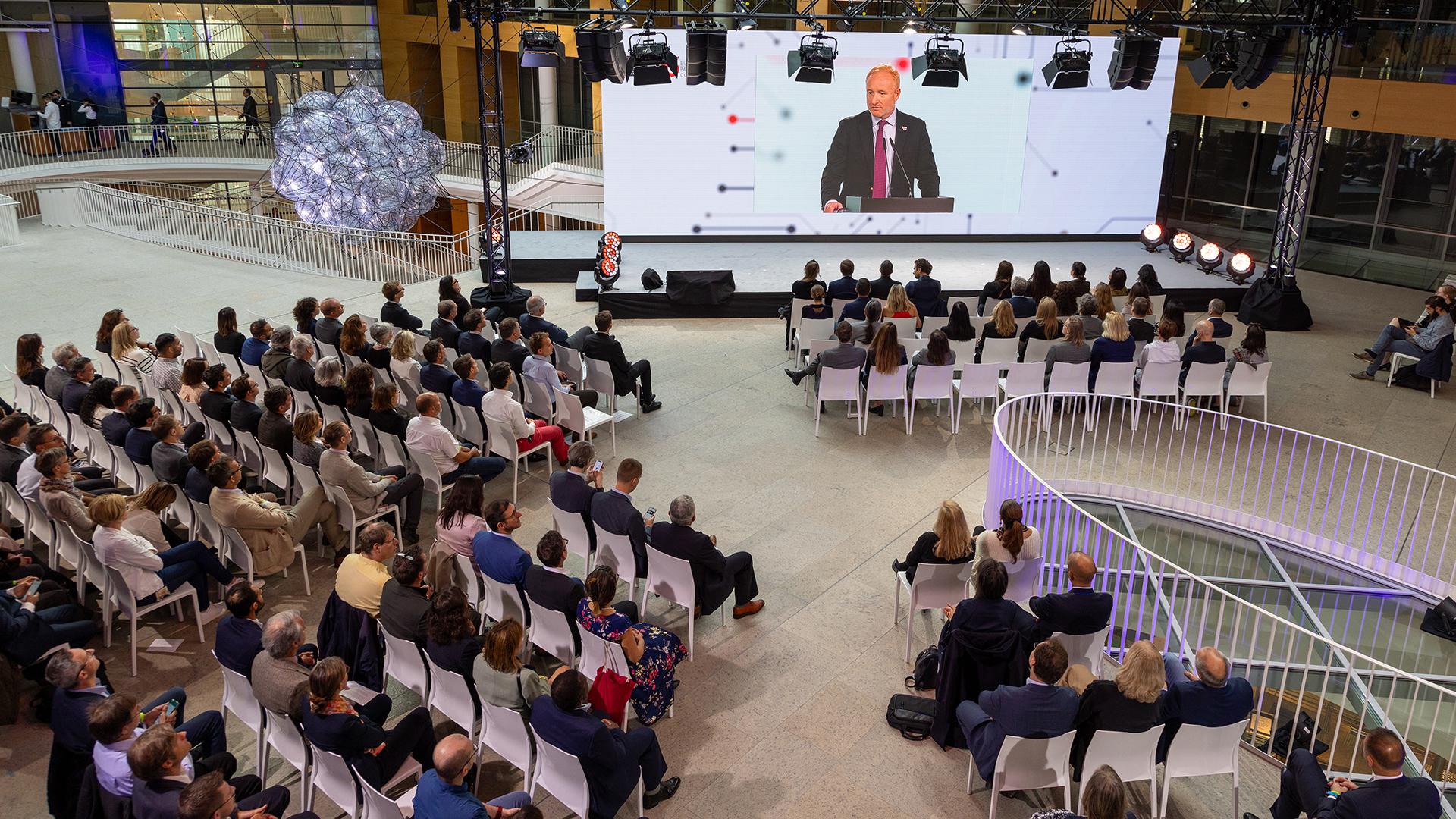Historic celebration of innovation

Yesterday saw the celebration of the 50th anniversary of the European Patent Convention (EPC), a key milestone in the journey to support innovation and European integration. The Convention, signed on 5 October 1973, created the European Patent Organisation and its implementing authority, the European Patent Office (EPO), and laid the foundations for the European patent system, which has fostered innovation and economic growth across Europe for the last five decades. Thursday’s major international event took place across several EPO sites.
“Our European Patent Convention turns 50 today. In this legal testament lies a powerful expression of the combined aspirations of a continent desiring peace and prosperity, and united by a common vision for innovation in Europe,” said EPO President António Campinos yesterday. “In the last few years, we have sought to elevate our endeavours in different areas, such as in our patent grant process, in quality, in the technologies we use, in terms of international co-operation. And so often we have stood on the shoulders of giants – past and present – who have helped us to reach this point… to become the organisation we are today”.
To commemorate this historic occasion, the EPO held a public hybrid event, paying homage to the achievements made possible by the EPC and all those involved. Streamed worldwide, the celebrations featured distinguished guests such as His Majesty King Willem-Alexander of the Netherlands, Ursula von der Leyen, President of the European Commission, Rumen Radev, President of Bulgaria, and Olaf Scholz, Chancellor of Germany.
Ursula von der Leyen, President of the European Commission, said: “It is only fitting that the 50th anniversary of the European Patent Convention coincides with the 30th birthday of the European single market. Patents and competitiveness are two sides of the same coin. Therefore, it is excellent that the European Commission and the EPO work so closely together. And there is no better example of our outstanding cooperation than the Unitary Patent system. Simulations suggest that this system could generate nearly 2 billion euros in additional foreign direct investment into the European Union. Businesses in Europe can finally begin to benefit from a single market for technology.”
Chancellor of Germany Olaf Scholz said: "The impressive figure of 2.2 million European patents shows, firstly, the great diligence and dedication with which the employees of the European Patent Office go about their work. And secondly, it stands for Europe's unwavering innovative strength and competitiveness,” said. “The European Patent Office has always seen itself as a driver of innovation and growth – and its success confirms this".
“The signing of the European Patent Convention 50 years ago marked the beginning of a successful regional collaboration to help inventors share their ideas beyond borders”, said the United Nations Secretary General, António Guterres. “Innovation is vital to sustainable development. It drives progress in food systems, healthcare, clean energy, and many other areas that improve people’s lives worldwide. Halfway to the deadline for the 2030 Agenda, we must come together to rescue the Sustainable Development Goals, accelerate climate action and leave no one behind”.
To tie in with the anniversary, today the EPO has launched an Observatory on Patents and Technology. The Observatory will provide a unique forum that unites public and private stakeholders to tackle emerging intellectual property trends and technologies, and address challenges such as climate change and the transition to cleaner energy systems. The launch of the Observatory is part of the EPO's commitment to supporting innovation for the next 50 years and its first event will take place on 17 October, engaging with startups across Europe and beyond.
Celebrating five decades of growth and prosperity
The very first patent granted by the EPO was in January 1980 for a device that determines if coins placed in parking meters and train ticket machines are authentic. Since then, the EPO has granted over two million European patents for technological breakthroughs, many of which have changed our world; from the well-known QR code and MP3 format to life-saving vaccines and cutting-edge automotive stability systems.
From just 16 signatory states in 1973, the European Patent Organisation now has a membership of 39 member states. Thanks to additional validation and extension agreements, the EPO’s centralised patent granting procedure now enables companies, researchers and inventors to obtain a high-quality patent valid in up to 44 countries, covering a market with some 700 million people. Furthermore, the EPO has forged ahead with third-country agreements to achieve greater harmonisation and higher quality in patent systems around the world.
Often leaders in their technical field, some 6 300 dedicated and skilled staff members currently work at the EPO, across its headquarters in Munich, and in offices in The Hague, Berlin, Vienna and Brussels. Together, they are also a testament to the diversity of European technical know-how, representing 34 different nationalities.
A further boost for inventors was provided by the launch of the Unitary Patent system on 1 June 2023. With its foundations in the EPC itself, the Unitary Patent underscores the commitment to simplifying and streamlining the patenting process for innovators and business. This latest headline development largely completes the vision of the founders of the European Patent system, fifty years after the treaty was signed that started such a remarkable journey.
Many of the discussions that began at yesterday’s event can be continued on our social media channels, including by following the EPO’s 50 leading tech voices, some of whom spoke at yesterday afternoon’s inspiring panel discussions on the future of sustainable technologies, including in the fields of health, space, energy and digitalisation.